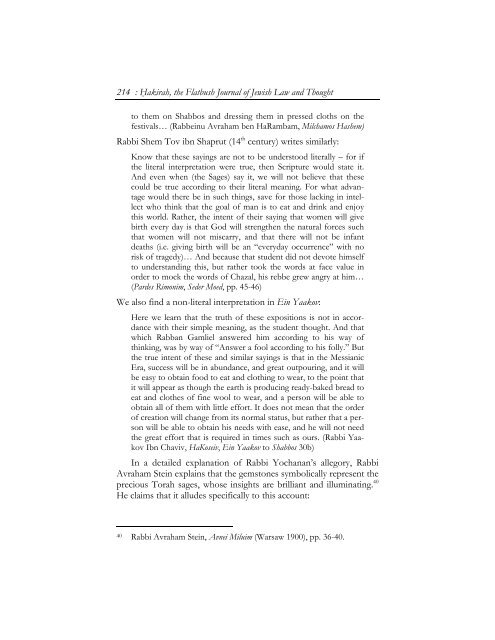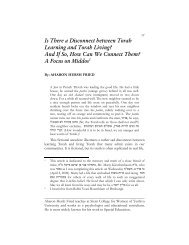Messianic Wonders and Skeptical Rationalists - Hakirah.org
Messianic Wonders and Skeptical Rationalists - Hakirah.org
Messianic Wonders and Skeptical Rationalists - Hakirah.org
You also want an ePaper? Increase the reach of your titles
YUMPU automatically turns print PDFs into web optimized ePapers that Google loves.
214 : Hạkirah, the Flatbush Journal of Jewish Law <strong>and</strong> Thought<br />
to them on Shabbos <strong>and</strong> dressing them in pressed cloths on the<br />
festivals… (Rabbeinu Avraham ben HaRambam, Milchamos Hashem)<br />
Rabbi Shem Tov ibn Shaprut (14 th century) writes similarly:<br />
Know that these sayings are not to be understood literally – for if<br />
the literal interpretation were true, then Scripture would state it.<br />
And even when (the Sages) say it, we will not believe that these<br />
could be true according to their literal meaning. For what advantage<br />
would there be in such things, save for those lacking in intellect<br />
who think that the goal of man is to eat <strong>and</strong> drink <strong>and</strong> enjoy<br />
this world. Rather, the intent of their saying that women will give<br />
birth every day is that God will strengthen the natural forces such<br />
that women will not miscarry, <strong>and</strong> that there will not be infant<br />
deaths (i.e. giving birth will be an “everyday occurrence” with no<br />
risk of tragedy)… And because that student did not devote himself<br />
to underst<strong>and</strong>ing this, but rather took the words at face value in<br />
order to mock the words of Chazal, his rebbe grew angry at him…<br />
(Pardes Rimonim, Seder Moed, pp. 45-46)<br />
We also find a non-literal interpretation in Ein Yaakov:<br />
Here we learn that the truth of these expositions is not in accordance<br />
with their simple meaning, as the student thought. And that<br />
which Rabban Gamliel answered him according to his way of<br />
thinking, was by way of “Answer a fool according to his folly.” But<br />
the true intent of these <strong>and</strong> similar sayings is that in the <strong>Messianic</strong><br />
Era, success will be in abundance, <strong>and</strong> great outpouring, <strong>and</strong> it will<br />
be easy to obtain food to eat <strong>and</strong> clothing to wear, to the point that<br />
it will appear as though the earth is producing ready-baked bread to<br />
eat <strong>and</strong> clothes of fine wool to wear, <strong>and</strong> a person will be able to<br />
obtain all of them with little effort. It does not mean that the order<br />
of creation will change from its normal status, but rather that a person<br />
will be able to obtain his needs with ease, <strong>and</strong> he will not need<br />
the great effort that is required in times such as ours. (Rabbi Yaakov<br />
Ibn Chaviv, HaKoseiv, Ein Yaakov to Shabbos 30b)<br />
In a detailed explanation of Rabbi Yochanan’s allegory, Rabbi<br />
Avraham Stein explains that the gemstones symbolically represent the<br />
precious Torah sages, whose insights are brilliant <strong>and</strong> illuminating. 40<br />
He claims that it alludes specifically to this account:<br />
40 Rabbi Avraham Stein, Avnei Miluim (Warsaw 1900), pp. 36-40.
















